A Vice Admiral and WWII Hero Condemns Nuclear Weapons 70 Years After Nagasaki and Hiroshima
Long-ago visits to ground zero of the atomic bombings convinced this highly decorated military man of the abject immorality of ever using such technology.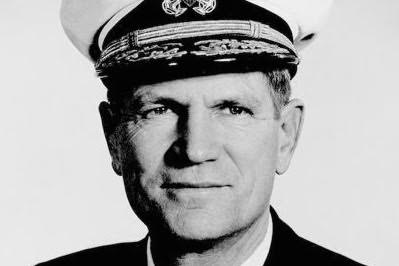

Vice Adm. Ralph Weymouth. (Photo credit, Ralph Weymouth)
In 1950, my grandfather, Ralph Weymouth—a decorated World War II naval aviator who would become a vice admiral—stood inside the Nagasaki Atomic Bomb Museum, viewing for the first time the human cost of the atom bomb. He saw a child’s charred lunchbox, a helmet with the remains of a victim’s skull still stuck to the interior, a clock frozen at 11:02, and the one thing he’ll never forget: “fingers on a human hand ossified in glass.”
Last week my grandfather told me this was the moment that changed him. The eldest of three boys, he joined the military as a midshipman at age 17 to help his divorced mother in the midst of the Great Depression. He entered the Navy with “a schoolboy mentality” about the military: “I was your typical young, ardent performer.” The four visits he made to ground zero during his service in the Korean War left an indelible imprint on his views, leading eventually to his transformation from military man to activist for nuclear disarmament.
“I could see the facts from a different viewpoint,” he said, “right there at ground zero.” The remnants of the blast, the apology letter from some 50 physicists, the Smyth Report, released just days after the blasts—all these things conspired to transform my grandfather from a man who believed that war was inevitable into a man who believes that peace is possible.
Ralph is part of a generation of men who were taught that boys don’t emote—so when he says that what he saw was “pretty awful,” what I gather is that he was shaken to the core. Unable to fully voice his views within a secretive and pro-nuclear military, after his retirement in 1973 he become an advocate for peace and eventually a board member of Veterans for Peace. But he doesn’t appreciate those who would write him off as a fringe thinker: “I regret that I have been incorrectly described as a traitor or peacenik or pacifist. … I am an anti-nuclear-weapon determined ex-warrior.”
Now 98, Ralph is one of the few remaining American World War II veterans who remember the true cost of nuclear war. Over the course of his career he received the Navy’s highest award, the Navy Cross, for his actions as a pilot of a carrier-based dive bomber and commanding officer of bombing Squadron 16 in the east Philippine Sea; he received two Legion of Merit medals and four Distinguished Flying Cross medals for “extraordinary achievement” in aerial combat in WWII and the Korean War. In the course of his 35-year career he commanded squadrons, air groups and ships; he was commander of the Iceland Defense Force and on the staff of the chief of naval operations and the secretary of defense for internal security affairs.
Ralph confounds all movie stereotypes of brutish military men. He is a lanky 6 feet 6 inches tall, still has a full head of hair and has sea-blue eyes. While he has a few more wrinkles than he used to and moves a bit slower, he’s still handsome, charming, and a powerful blend of gentleness and strength. Even at 98 he’s inordinately stubborn in his refusal to accept help or the fact that he’s not 25 anymore. Last week, he tried doggedly to remove a canoe from the top of my aunt’s car, even though he had just recuperated from breaking a hip in a fall. At Bearcamp Pond in his native New Hampshire, surrounded by towering pines and an untouched natural landscape, I climbed into the canoe with him. It took all of my strength (at age 47) to keep up with his paddling, but I wanted to earn his respect, and I wanted some of his determination to rub off on me.
I imagine it was this kind of stubbornness that made him a great admiral—he’s not one to easily admit defeat, nor is he willing to let fear or old age get the better of him, nor is he willing to concede that we’ve lost the chance to save this planet from further destruction. He likes to repeat a mantra from President Kennedy’s speech at the time of the Bay of Pigs debacle with Cuba: “War is not inevitable.”
When I told my grandfather that I wanted to interview him for the 70th anniversary of the Hiroshima and Nagasaki bombings, he got so stirred up that he rushed across the two-lane highway with his off-road walker to interrupt my breakfast. My twin sons and I were staying in the tiny wood cabin that he had rebuilt and lived in for years with my French grandmother, Lo Weymouth. “Sit down,” he said, after ducking so he wouldn’t hit his head on the front door frame. I thought I’d offended him, or that someone had died; but I finally gathered that he saw this as his last chance to tell the world what he’s learned in his 98 years, and the gravity of my task weighs upon me. Can I really tell a story that will convince our citizens or leaders to wake up? Do the politicians and military powers who matter even read newspapers anymore? Can one journalist’s story make a difference?
During the Cold War, Ralph participated in meetings in which nuclear war was being planned, considered, discussed. His inner struggle over the ethics of what our nation was planning tore him apart. “All of us left those meetings starry-eyed. I was terrified by this time that we were trigger-happy. [I felt] a growing disturbance about whether it was really right to be enchanted with maximum [use of] force; it was becoming part and parcel of our system,” he said.
The atom bombings, and more recently the earthquake at Japan’s Fukushima nuclear reactor, were proof of what Ralph began to realize 65 years ago at the Atomic Bomb Museum. “To think that we can make a perfectly safe nuclear power plant is wrong,” he said. “The whole pyramid of nuclear command is full of places where mistakes can be made. A lot of them are people mistakes: The system is so sophisticated, and the weapons so complicated, much of it covered with secrecy, that a human error can occur almost anywhere in the system.”
My grandfather recounted a story about a near miss that would be funny if it weren’t true. It occurred over northern Greenland in 1960, one of multiple near misses that nearly launched full-scale nuclear war. The Ballistic Missile Early Warning System had reported with 99.9 percent certainty that the Soviets had launched missiles at the U.S. “You know what it turned out to be?” Ralph asked. “It was the moon coming up over the horizon.”During the Cold War, Ralph was evolving into a skilled negotiator. He was called upon several times to mediate the growing competition between the Navy and the Air Force. In these negotiations he saw the power of words to do what war cannot.
“There was a body of thought submerged within the military that nuclear weapons were bad,” but the climate of the military did not allow for opposition, he said. Ralph tried to advocate for adherence to the Geneva Conventions, he lobbied against those who wanted to use laser methods to blind the enemy, he lobbied against nuclear weapons for the same reason. But his voice was drowned out, the push for nuclear proliferation won, and conventional warfare was replaced by the kind of wars we’re embroiled in today, in which civilians are killed or harmed “by accident,” and the wars themselves and the treatment of POWs flout the Geneva Conventions’ rules, rules intended to protect our own soldiers as much as the soldiers and citizens of our adversaries.
Ralph is honest about the seductive power of war, how it can trick you into forgetting your own moral compass. Or worse, killing becomes strangely addictive because of the language that dehumanizes your actions; you aim to blow up “targets,” not humans. But of course inside there are humans.
“I loved flying,” he told me. “Yet to turn that into bombing a ship? I got to love bombing [after a while]; all those [moral] revulsions evaporate after a while.” He was not the kind of military man who abused his power. He told me about the farmer with an ox cart that he told his fleet not to shoot at, despite orders from above to “shoot everything that moved.” There are few things that scare Ralph, but one of them is the way he saw our military lose sight of the values we were trying to defend.
Coupled with his museum visits, the Smyth Report woke Ralph to the barbarity of nucelar war: “A weapon has been developed that is potentially destructive beyond the wildest nightmares of the imagination; a weapon so ideally suited to sudden unannounced attack that a country’s major cities might be destroyed overnight by an ostensibly friendly power.” It is startling, and sad, how relevant Smyth’s words are today:
“Because of the restrictions of military security there has been no chance for the Congress or the people to debate such questions. … The men on the project have been thinking as citizens of the United States vitally interested in the welfare of the human race. … In a free country like ours, such questions should be debated by the people and decisions must be made by the people through their representatives.”
Ralph remembers the Japanese attempts to surrender before the dropping of the bombs. He recalls that they were trying to save their emperor; they sought a way out that would allow them to save face. He believes that President Harry Truman did not have to order the bombing, that a bomb demonstration (which many scientists on the Manhattan project strongly advocated for) would have been enough to persuade Japan to surrender. At the time, and for years afterward, the U.S. government sold the bombings to the American people as necessary in order to “save American lives.” Ralph’s second wife, Diana Beliard, a student at Radcliffe during the war, told me, “You have to understand: We were so afraid. It was us versus them.”
When Ralph learned that Japan had surrendered, he got drunk for the second (and last time) in his life. Soldiers kissed women in the streets, couples danced, children played; while in Japan grandfathers, grandmothers, mothers, fathers, schoolchildren and babies had been incinerated, charred or scarred for life by the radioactive blasts that killed at least 140,000 in Hiroshima and 70,000 three days later in Nagasaki. The blasts were so hot that some victims, on their way to work or school or praying in churches or temples, evaporated, leaving only silhouettes burned onto concrete.
When I asked Ralph the question that truly gnaws at me: “Is the world today more disastrous than it was when you were young?” he said no. He’s an optimist who refuses to give in to despair. Shortly after the death of my grandmother, his wife of 68 years, Ralph to his own surprise fell in love for the second time in his life. At 94, he married Diana — his next-door neighbor, a journalist, an activist in her own right, the daughter of a journalist who had been kicked out of Germany by the Nazis.
My grandfather continues to teach me that the impossible is never totally out of reach. If he can fall in love at 94 and paddle a canoe at 98, perhaps it’s also true when he says, “Every war can be examined to find that its buildup contained opportunities to halt the eventual moment when there was no alternative. … War is not inevitable.”
As we navigate an uncertain 2025, with a new administration questioning press freedoms, the risks are clear: our ability to report freely is under threat.
Your tax-deductible donation enables us to dig deeper, delivering fearless investigative reporting and analysis that exposes the reality beneath the headlines — without compromise.
Now is the time to take action. Stand with our courageous journalists. Donate today to protect a free press, uphold democracy and uncover the stories that need to be told.
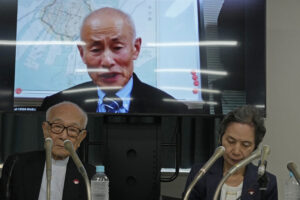
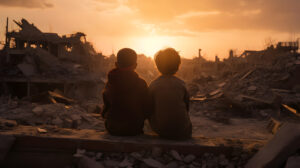
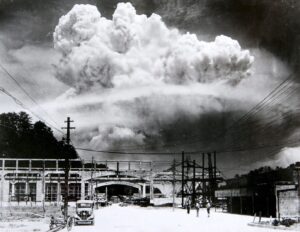
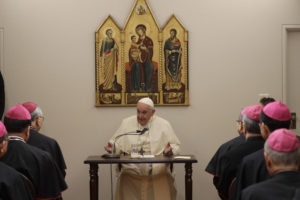
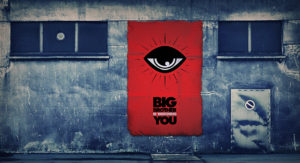
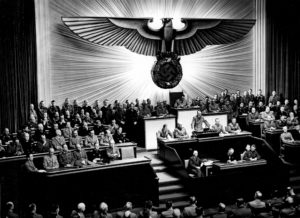
You need to be a supporter to comment.
There are currently no responses to this article.
Be the first to respond.